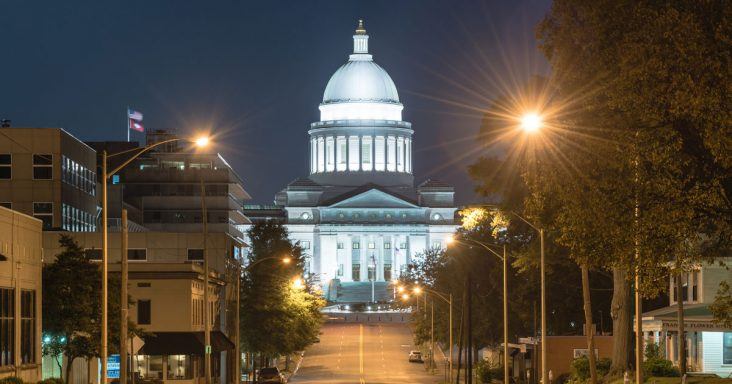Lawmakers make progress on tax reform, school safety measures; session could conclude Thursday
by August 10, 2022 8:48 pm 1,158 views

Arkansas legislators moved tax reform and school safety legislation across the capitol rotunda Wednesday (Aug. 10) as they hope to wrap up a special session on Thursday.
Bills forwarded from House and Senate committees on Tuesday easily cleared their vote hurdles on Wednesday. Comprehensive bills to accelerate the reduction of the top individual and corporate income tax rates, increase depreciation deductions, and offer a tax credit next filing season for workers making $87,000 easily passed the House and Senate chambers. The total tab for the tax reform measure is approximately $400 million.
A $50 million grant fund for schools to apply for school safety improvements also passed both chambers.
The bills will be considered on Thursday by the other chambers’ members and, if approved, will be sent to Gov. Asa Hutchinson for signature. But there was debate and pushback on the need to accelerate tax cuts in the House and the Senate.
While supporters of the tax cut acceleration argued that it will provide relief to taxpayers, Rep. Andrew Collins, D-Little Rock, questioned whether the tax cuts would pump more money into the economy, thus increasing inflationary pressures. He also quizzed the bill’s lead sponsor, Rep. Joe Jett, R-Success, if the tax break would help the economy.
“You think $2,000 for a millionaire is going to prompt him to hire a bunch of employees or expand his business or change his spending habits or pay his employees a living wage? You think $2,000 will prompt businesses to locate here in Arkansas?” Collins asked.
Jett said lowering the state’s top tax rate would help more than just wealthy individuals.
“Everybody who’s going to make above $23,600 is going to be in that 4.9% bracket. They get the benefit of this. Somebody go out in the public here in Arkansas and find somebody that’s making $23,600, and you ask them if they’re wealthy,” Jett said. “$23,600 is not a lot of money. I couldn’t live on it.”
Some lawmakers, Democrat and Republican, also expressed concerns over the federal government clawing back a portion of money sent to the states in the pandemic if tax cuts are accelerated. States are prohibited from spending COVID stimulus funds on tax cuts and there are federal lawsuits in motion that will determine the fate of Arkansas and other tax-cutting states.
Sen. Jonathan Dismang, R-Beebe, a lead Senate sponsor of the tax reform bill, said state finance officials were confident Arkansas was not in violation of having to give back hundreds of millions of dollars.
“It was kind of questioned whether what we’re doing is legal. There is no question about the legality of passing tax cuts in the state,” Dismang said.
DEMOCRATS SEEK TO EXTEND SPECIAL SESSION
On Wednesday, Democrats held a press conference to rally support for a teacher pay raise. While Gov. Hutchinson did not put it on the special session call, lawmakers can add it to their agenda if both chambers muster a two-thirds vote.
Democrats are in the minority in both chambers and would need support from a swath of Republican legislators to achieve that goal. With a $1.6 billion budget surplus, Democrats contend that tax cuts and teacher pay raises can be done. The estimated cost of a Democratic plan to raise teacher pay by $4,000 and the minimum teacher salary from $36,000 to $42,000 is roughly $600 million.
Republican leadership wants to wait until an education adequacy study is completed this fall before committing to teacher pay raises. They have argued that the teacher pay hikes can wait until next year’s regular legislative session, although that would delay pay increases for another school year. Rep. Megan Godfrey, D-Springdale, said Democrats are worried teacher ranks are dwindling due, in part, to low pay and the time to act is now.
“Our teachers are building a brighter Arkansas for all of us. Raising teacher pay is one of the best ways we can show our appreciation, improve recruitment and retention and compete with the higher teacher salaries in surrounding states,” Godfrey said.
Once all of the legislation on the special session call has cleared a chamber, lawmakers in that chamber can try to advance items that require the two-thirds threshold to be added. Attempts to do this are expected on Thursday.
Editor’s note: KUAR’s Ronak Patel contributed to this report.
